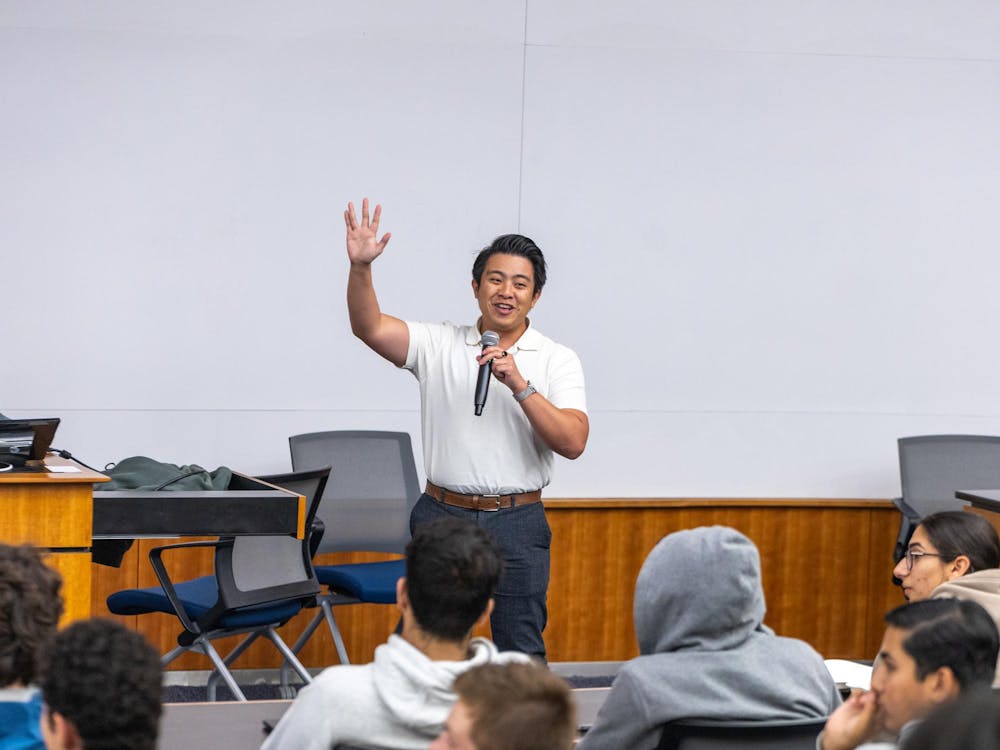Duke Graduate and Professional Student Government passed three bills related to senate procedures and updated its Standing Rules of Order during its Tuesday meeting.
Chris Simmons, vice president for government relations, was scheduled to give a presentation on how Duke is responding to recent actions by the Trump administration. Upon Simmons’ request, the presentation was rescheduled for March 18.
Senate bills
The senate unanimously passed three bills proposed by the rules and nominations committee.
Daniela Pereira Salas, a third-year law student, GPSG chief justice and chair of the rules and nominations committee, introduced a bill to fill a “gap” in the senate’s bylaws if an unexpected vacancy occurs in the speaker position.
The bill specifies that if a vacancy occurs after three-quarters of a term’s completion, the election for speaker will be moved up and the newly elected speaker will begin their term early. If a vacancy occurs prior to the three-quarter benchmark, an interim speaker will be appointed by the rules and nominations committee and — if approved by the senate — serve until elections take place.
The second bill proposed amending a speaker’s term to begin and end in the spring instead of the fall.
“Historically, the speaker has been a position that’s hard to fill,” Pereira Salas said, noting that holding speaker elections in the spring would help put “more eyes” on the position and allow them to be trained over the summer.
She also explained that if the role is not yet filled in the spring, leadership can work to find a solution over the summer, which would be less “disruptive” than a vacancy during the academic year.
Meanwhile, second-year law student Kyle Beck noted that it may be more “democratic” to hold speaker elections in the fall, enabling newly elected senators to select their own speaker. Pereira Salas acknowledged this difficulty, but noted that “it just made more sense to give the position more time” to prepare.
Tanner Morgan, a second-year student at the Fuqua School of Business, noted that this change could “widen the pool of applicants” by allowing students in two-year programs to run in the fall of their second year, rather than being required to run in the spring of their first year.
“As the speaker, I can definitely say a term change is going to be beneficial for the next speaker because coming in in August is kind of an overload of information,” said Matt Jenkins, GPSG speaker and third-year master’s candidate at the Divinity School.
The third bill proposed clarifications to the roles and responsibilities of GPSG senators. According to the bill, senators would be required to attend all senate meetings either in-person or virtually and provide advance notice of unavoidable absences, serve on at least one standing committee and act as a liaison between their respective school and the senate.
Updates to the Standing Rules of Order
Jenkins proposed a series of changes to the Standing Rules of Order, which he described as the “document that governs” the senate. To pass, the proposed rules must receive a majority vote.
The changes took place in response to an internal restructuring of GPSG legislature during the 2022-23 academic year. The proposal largely focused on revising procedures and language to adhere to GPSG’s new structure.
Other changes included implementing semesterly committee reports and restructuring voting procedures so that senators can only vote once. Previously, members of the General Assembly who were pursuing a dual degree were allowed to represent both schools at the same time.
“Now that we’re down to 36 senators, double dipping would really detract from the wealth of information that we’re getting here,” Jenkins said.
The proposal was passed unanimously.
Get The Chronicle straight to your inbox
Sign up for our weekly newsletter. Cancel at any time.
Kate Haver is a Trinity sophomore and a university news editor of The Chronicle's 120th volume.

